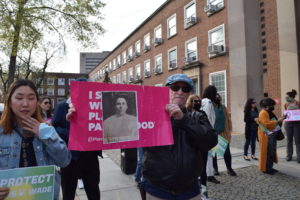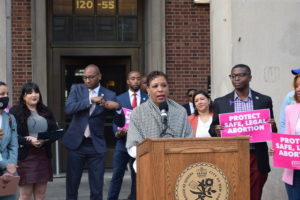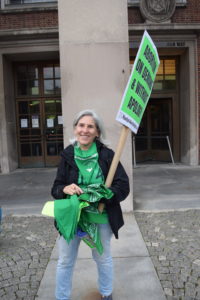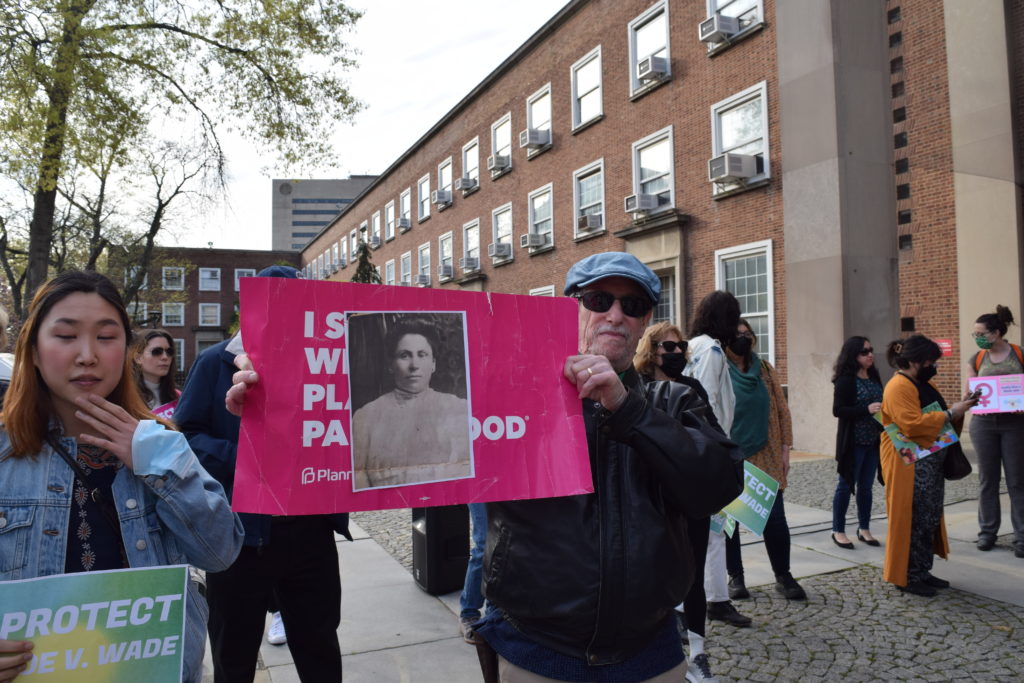Local elected officials, gender justice groups, and other community advocates followed the lead of other protesters across the country when they gathered at the steps of Queens Borough Hall to fight for abortion rights.
Outrage sparked nationwide in response to a leaked Supreme Court draft to overturn Roe v. Wade, which set the precedent to protect a woman’s right to an abortion in the ‘70s.

A Forest Hills resident holds up a sign with a photo of his grandmother, who died as a result of an unsafe abortion.
Merle Hoffman, who founded Choices Women’s Medical Center before Roe v. Wade said that as a result, women’s rights in the United States are in a “state of emergency.”
Hoffman founded Choices Women’s Medical Center in 1971 as one of the country’s first abortion centers.
She said that over the years, she’s been invaded, harassed and received death threats for performing abortions — and that the one thing that kept her going was the women and patients she was able to assist.
“I was only 25 years old, and one day abortion was illegal, a sin, and a crime. The next day, women were lining up to have them in New York,” Hoffman said.
“That first patient, Helen, was my epiphany that led me to this struggle and to understand that this is what I had to spend my life doing,” she continued. “I had my abortion when I was 32 years old — I was married, I had all the support I needed. I just didn’t want to be a mother at that time, and that’s enough. My decision is enough.”
Queens Borough President Donovan Richards, who organized the rally, stood in solidarity with women fighting for their rights. He echoed Hoffman’s sentiment that the U.S. cannot go into a post-Roe society.
“I will never truly know what it means or how painful it is to seek or need an abortion. But as a Black man whose ancestors were brought here in chains and deemed three fifths of a person, I want you all to know I stand with you today as an ally,” Richards said. “Abortion is healthcare and a fundamental human right. Queens will not stay silent as Roe is gutted by five right wing justices, in black robes, as if they were the Grim Reaper trying to destroy one of our country’s most sacred rights.”
He emphasized that overturning Roe v. Wade would simply be a ban on safe abortions, and that women would continue to seek them in other ways — many of which are unsafe.
Councilwoman Lynn Schulman shared the story of how in the 1800s, her great grandmother died trying to give herself an abortion.
“We’re going back to the 1800s. We cannot let that happen,” Schulman said. “I’ve gotten messages from people in this district who said they don’t want their taxpayer money used for abortion. They don’t believe in reproductive rights; it is horrible. We have to make sure that we go out and fight, that we go out and vote and organize because our lives depend on it.”

Council Speaker Adrienne Adams speaks to the crowd
She added how proud she is to be a woman on the female majority-led City Council with the first African American woman to be speaker.
Council Speaker Adrienne Adams reiterated that Queens will always support the right to safely access abortion and reproductive healthcare.
“No Supreme Court decision made by a majority of white men who will never understand the pain or heartbreak that goes into making the difficult decision to terminate a pregnancy will ever change that fundamental right,” Adams said.
“Several states have already passed trigger laws that would outlaw abortion if Roe were overturned,” Adams continued. “Those who cannot afford to get access out of state, those who cannot have access to reproductive care in state, poor and low income Americans will be left out, but here in New York we will do what we can to support people coming from outside our state to seek care.”
Members of local gender justice groups South Queens Women’s March and Jahajee Sisters encouraged New Yorkers to continue to fight for safe abortion and support clinics that offer the service.

Joan Hirsch of Rise Up 4 Abortion Rights took donations from attendees that would go to funds for safe abortions.
“We’ve got to show up and join these actions, put our bodies out there, and let this whole nation know that we are not taking this lightly,” Tannuja Rozario, a founding member of South Queens Women’s March, said. “Our liberation as a whole is tied to the liberation from reproductive injustice. If you care about the right to vote, environmental justice, or food justice, all these issues are linked. Reproductive justice should be important to you.”
“We must do everything as a borough, as a city, and as a people to protect decision making power for all,” Felicia Singh, of the Jahajee Sisters, said. “This means taking to the streets and showing up in mass. This means supporting abortion funds from our local independent clincics that will bear the brunt of this work. This means establishing an abortion access fund in New York State, creating a state public fund for abortion care… and a public option for healthcare for all people regardless of immigration status.”
Joan Hirsch, an advocate from Rise Up 4 Abortion Rights, took donations from attendees that would go to funds for safe abortions. The organization is participating in the national week of action for abortion rights, which takes place from May 8-14.
“You cannot capitulate to this. We have to fight this now and get in the streets. Only the people can stop this,” Hirsch said. “Forced motherhood is female slavery. We are fighting for abortion on demand and without apology.”



